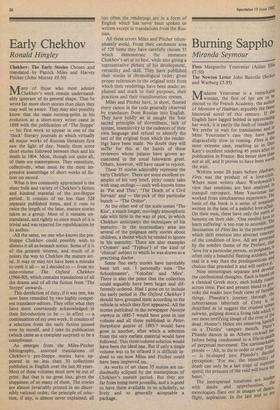Early Chekhov
Ronald Hingley Chekhov: The Early Stories Chosen and translated by Patrick Miles and Harvey Pitcher (John Murray £9.50) Many of those who most admire Chekhov's work remain understand- ably ignorant of its general shape. That he wrote far more short stories than plays they may well be aware. They may also possibly know that the main turning-point in his evolution as a short-story writer came in 1888 with the publication of 'The Steppe' — his first work to appear in one of the `thick' literary journals in which virtually all major works of Russian literature first saw the light of day. Nearly three score short stories followed between then and his death in 1904. Most, though not quite all, of them are masterpieces. They constitute, collectively, what must be the most im- pressive assemblage of short works of fic- tion on record.
What is less commonly appreciated is the sheer bulk and variety of Chekhov's fiction and kindred material of the pre-Steppe period. It consists of no less than 528 separate published items, and it runs to twice the length of the later, mature stories taken as a group. Most of it remains un- translated, and rightly so since much of it is trivial and was rejected for republication by its author.
All the same, no one who knows the pre- Steppe Chekhov could possibly wish to dismiss it all as beneath notice. Some of it is of the greatest interest, and much of it points the way to Chekhov the mature art- ist. It may or may not have been a mistake to omit it all — as I decided to — from my nine-volume The Oxford Chekhov (1964-80), which contains translations of all the drama and of all the fiction from 'The Steppe' onwards.
This dereliction of duty, if it was one, has now been remedied by two highly compet- ent translator-editors. They offer what they have most courteously acknowledged in their Introduction to be — in effect — a continuation of my own work. It consists of a selection from the early fiction passed over by myself, and I take its publication (which came as a complete surprise) to be a compliment.
As emerges from the Miles-Pitcher bibliography, assorted translations of Chekhov's pre-Steppe stories have ap- peared in no less than 30 collections published in English over the last 80 years. Most of these volumes must now be out of print. But that is no great loss, given the sloppiness of so many of them. The stories are almost invariably printed in no discer- nibly rational order; the principle of selec- tion, if any, is almost never explained; all too often the renderings are in a form of English which has never been spoken or written except in translations from the Rus- sian.
All these errors Miles and Pitcher trium- phantly avoid. From their catchment area of 528 items they have carefully chosen 35 which demonstrate the immature Chekhov's art at its best, while also giving a representative picture of his development, versatility and skill. They have published their stories in chronological order; given proper references to the original texts from which their renderings have been made; ex- plained and stuck to their purposes, their practices and their transliteration system.
Miles and Pitcher have, in short, flouted every canon in the code generally observed by translators from Russian into English. They have boldly set at naught the four sacred principles of slovenliness, lack of system, insensitivity to the cadences of their own language and refusal to identify the text of the original from which the render- ings have been made. No doubt they will suffer for this at the hands of those reviewers whose palates have grown ac- customed to the usual lukewarm gruel. Others, however, will have cause to rejoice.
These 35 stories admirably represent the early Chekhov. There are some excellent ex- amples of his very brief, pithy comic tales with snap endings — such well-known items as Tat and Thin', 'The Death of a Civil Servant' and — the pick of this particular bunch — 'The Orator'.
At the other end of the scale comes 'The Kiss', a much longer, movingly atmospheric tale with little in the way of plot, in which Chekhov anticipates the techniques of his maturity. In the intermediary area are several of the poignant early stories about children, a theme which he tended to ignore in his maturity. There are also examples (`Oysters' and 'Typhus') of the kind of `clinical' subject to which he was drawn as a practising doctor.
Some fine early stories have inevitably been left out. I personally miss 'The Schoolmaster', `Volodya' and 'Mire'. There is also the point that the collection could arguably have been larger and dif- ferently ordered. Had I gone on to include the early period in The Oxford Chekhov I should have grouped them according to the vehicle in which they first appeared. All the stories published in the newspaper Novoye vremya in 1885-7 would have gone in one volume and all those published in Peter- burgskaya gazeta of 1885-7 would have gone in another, after which a selection from the very earliest material would have followed. This three-volume solution would have been the ideal one. But if only a single volume was to be offered it is difficult in- deed to see how Miles and Pitcher could have been improved on.
As works of art these 35 stories are un- doubtedly eclipsed by the masterpieces of Chekhov's mature period. But they are far from being mere juvenilia, and it is good to have them available in so scholarly, so lively and so generally acceptable a package.




































 Previous page
Previous page